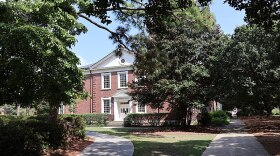State employees who work in downtown Raleigh have been on the move in recent months to make way for major office construction projects.
The legislature allocated about $400 million to build a new “education campus” to house the headquarters of the UNC System, N.C. Community College System and the Department of Public Instruction. The Department of Commerce will also be under the same roof, which lawmakers hope will be a boost for workforce development projects.
To make room for the new building, the state plans to demolish the Administration Building, which has housed the governor’s office and other executive branch agencies since it opened in the 1960s.
The plan has created an office space shuffle as hundreds of state workers from multiple agencies move around to make way for the displaced departments. The process is already a few months behind the schedule outlined in a recent state budget.
"It has been an incredible challenge," said Mark Edwards, chief deputy secretary at the Department of Administration, which is overseeing the moves. "The stuff that was laid out with was not possible to do."
The governor’s office and several other agencies are moving a block north to the Albemarle Building, which until recently housed the Department of Insurance. Insurance Commissioner Mike Causey moved all his employees to more expensive leased space outside downtown on Highwoods Boulevard to deal with a shortage of space.
"We will end up with more space to conduct operations than we had previously, and it's a very nice building, so we're really, really pleased with how it turned out," Causey said, adding that his staff is happy with the change. "The big advantage is parking: it doesn't cost the employees anything to park in that we have our own parking deck," he said, noting that downtown Raleigh government workers pay a fee to park in state-owned decks.
Even with the Department of Insurance move, not everyone can fit in the Albemarle building. The Office of State Human Resources will move to leased space in an office building at 333 Fayetteville Street.

Once the moves are complete early this year, the sounds of demolition will fill downtown Raleigh’s government complex. In addition to the Administration Building, crews will tear down a mostly windowless concrete behemoth known as the Bath Building. It used to house state health labs and will be replaced by open space.
Lawmakers tasked Legislative Services Officer Paul Coble — a former Raleigh mayor — with overseeing the construction projects. Senate leader Phil Berger and Rep. Dean Arp (R-Union) — a House budget writer — are also providing input, Coble said.
He says the Administration Building will prove challenging because it once housed the governor’s emergency shelter. It’s also directly across the street from the glass windows of the Museum of Natural Sciences.
"It'll be a deconstruction not an implosion," Coble said. "Again, because of how it's built, you just aren't going to knock it down, you're going to have to kind of deconstruct it as you go through."
Once that’s done, construction can begin on the education campus. Coble is working with the architecture firm LS3P on designing a seven- or eight-story building atop underground parking facing the corner of McDowell and Lane streets. Construction firms Barnhill, Balfour Beatty and Metcon are also involved in the project.
"We're pretty close to having everything (designed) to where we can show it," he said. "We just aren't there yet."
The site of the building has some unusual challenges. "Downtown Raleigh really sits on top of about three or four underground rivers, and they all seem to go through this area," Coble said.
That could limit how deep construction crews can dig. The design also will take into account the fact that many state employees now have a hybrid work schedule where they aren’t always in the office five days a week.
Coble says that resulted in a smaller overall office when the state auditor’s staff recently moved to the Albemarle Building.
"We were able to shrink her by 40%, because we could say, 'look, you have offices here for people who aren't here, maybe, but once a week or once every other week," Coble said. "That doesn't make any sense. They're working in the field, let's have shared offices."
The education building will be finished in 2026. But it’s far from the only major downtown Raleigh construction project in the planning pipeline. The governor’s office will eventually move to a new building on a site that’s currently a parking lot next to the governor’s mansion. Coble says he wants a place that can host visiting dignitaries and business leaders.
"You make it a small, really nice looking building, so when somebody comes, you've got something to really show them and impress them," he said.
Also in the works: A major renovation of the Education Building on Halifax Mall, and a new parking deck for state workers across from it on Wilmington Street. State leaders are still considering demolishing the Archdale Building, an office tower across Halifax Mall from the legislature that's often the subject of architectural criticism.
The building that currently houses the community college system on Jones Street could be demolished along with some of its neighbors. That block of downtown Raleigh was once Caswell Square — one of the five park-like squares when the city was first built as the state capital. The other ones include the state Capitol building's square along with Nash and Moore squares.
"We want to take everything off and return it to a park condition," Coble said. "We'll keep the Old Health Building (which has historic status). We hadn't figured out what to do with it yet. But that could be any number of things."
One thing you won’t see in the new state government buildings: Privately owned shops and restaurants. That was a goal of former Gov. Pat McCrory, who proposed mixed-use buildings to house state offices as part of his "Project Phoenix" initiative. Coble sees things differently.
"Our job is to be the government, and so that's what we need to be doing, not worrying about, ‘is there a Chick-fil-A on the ground floor, and is it doing well or not?’" he said.
Coble's leading role in the projects is an expansion of the job of legislative services officer, which primarily oversees the day-to-day operations of the legislative complex. Most state construction and real-estate projects are typically handled by the Department of Administration, which is part of the governor's administration.
Coble says putting the legislative branch in charge can make the project more efficient. "We have opportunities to move things along a little bit quicker," he said. "We still go through the processes where we can to make sure we're getting competitive bids."
But Edwards, at the Department of Administration, said there are advantages to having the State Construction Office involved.
"If we had to go out and pay commercially for the services: the design review, the inspection, the cost overrun prevention ... everything the State Construction Office does, it would cost a fortune," he said. "The State Construction Office is one of the best bargains in all of state government."







